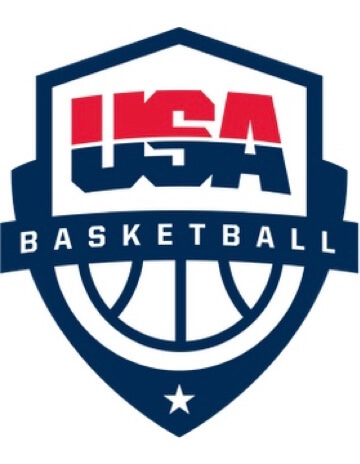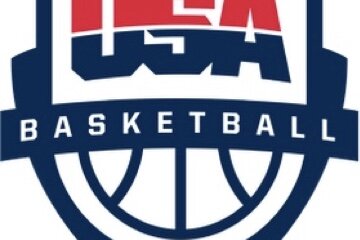Christopher Lawlor
USA U19 Women capture ninth gold medal, crushing Australia, 70-52, in FIBA World Cup title game; Iowa’s Caitlin Clark earns MVP, Sonia Citron adds All-Star Five Team honors

DEBRECEN, Hungary — What began as a quest for dominance ended in gold medal glory. The USA Women’s U19 Team made it eight gold medals in the last nine FIBA World Cup Championships on Sunday night.
A strong defensive effort helped propel undefeated USA to a 70-52 victory over Australia in the final.
Tournament Most Valuable Player Caitlin Clark, an Iowa sophomore who averaged team-highs of 15.2 points and 5.2 assists over the seven games, finished with nine points, seven rebounds and eight assists against Australia. She was joined on the All-Star Five Team by Sonia Citron (The Ursuline School, Scarsdale, N.Y.), who posted 10 points and five boards in the final, while averaging team second bests of 14.3 points and 7.7 boards in seven games.
“Every single time I do this, it’s really special,” said Clark, who is now a three-time USA Basketball gold medalist, including at the 2019 FIBA U19 World Cup. “But with this group of girls, playing a prominent role, this is my first time being the oldest one, it was different for me. It was a lot of fun for me to lead them and show them the ropes. We all came together so well.
“That’s what made this experience so fun, it wasn’t just individuals, it was the whole team, the coaching staff, everybody who is here put in a lot of time and that’s what made this whole tournament so fun for all of us.”
Also named to the all-tournament team were Hungary’s Julia Boros, Mali’s Sika Kone and Australia’s Jade Melbourne.
Now the two-time defending FIBA U19 World Cup gold medalist, since 2005 the USA U19 women have won eight of the past nine U19 golds. In all, USA women’s U19 teams have won nine gold medals, one silver medal and one bronze medal while compiling an 93-13 overall record in U19 World Cup play since the event was launched in 1985.
Even more impressive, the USA has posted a 69-3 record and won eight of the past nine U19 golds since 2005.
“I’m so excited for this team and everything we’ve accomplished together,” said USA head coach Cori Close (UCLA), who was an assistant coach for the 2019 USA U19 World Cup Team that claimed gold.
“Having been here before, it kept us really level emotionally,” Close added. “Everyone really believed that this was going to be a hard, different game. I am never sure that our team in Thailand (in 2019) completely understood that. But immediately after the game where we beat Australia handedly in pool play, in the locker room both Caitlin and I were referring to that experience. It really informed us on how to stay level and how the medal rounds were just going to be different.”
“This feels amazing,” said Citron, who was an all-tournament selection after leading the 2019 USA U16 National Team to gold. “We’ve been working for this for so long and it all paid off. It’s the best feeling to win this gold medal.
“It was such an honor (to be named to the U19 Word Cup All-Star Five Team), but I could not have done this without my teammates. They’re the reason why I am on that team.”
Host Hungary (5-2) earned its first U19 medal after earning an 88-67 victory over Mali (4-3) in the bronze medal game.
Diamond Johnson (North Carolina State) led the USA against Australia with 15 points; Te-Hina Paopao (Oregon) added 10 points, four rebounds and five assists; and 6-7 Lauren Betts (Grandview H.S., Centennial, Colo.) contributed nine points and 14 rebounds.
The first quarter was a battle, with neither side able to pull away and at the end of the first 10 minutes of play the USA was up 18-14 after a buzzer-beating long 3-pointer from Johnson hit its mark.
“Definitely my experience in 2019 helped,” said Clark, who helped the USA claim the 2019 gold in overtime against Australia. “Just knowing that Australia was going to hang with us for most of the time, especially during the first half. It’s a similar situation as last time – they’re playing a lot better than they did the first time we played (earlier in the tournament). I knew not to panic, keep everyone under control, and I knew that if we locked in on defense, we’d be fine.”
The Aussies hit a pair of 3s in a 12-6 run to open the second stanza and move ahead 26-24 at the 6:16 mark. However, five different U.S. players put up points in a 12-0 run that gave the red, white and blue a 36-26 lead with 1:11 to play before halftime. Australia got a bucket in the final minute to close to eight points, 36-28, at the midway point.
“The last two games, we played really good defense,” Close concurred. “It wasn’t a very pretty game, offensively. So, thank goodness our defense showed up. In the first half we got about six-straight stops out of our zone and that really turned the momentum of the game.”
The USA came roaring out of the locker room after halftime and, behind five different scorers, reeled off 11-straight points for a 19-point cushion, 47-28, midway through the third stanza. An Aussie 3 stopped the USA’s momentum but by the end of the third period the U.S. still held a double-digit lead, 55-38.
Australia managed to cut the gap to 14 points, 61-47, with 6:17 remaining in the contest, but then the USA hit three-straight buckets for a 67-47 advantage with 3:11 left in the game and cruised in for the golden victory.
In a night when their shots weren’t falling – the Americans connected on just 35.6% (26-73 FGs) of their shots – the USA women turned to their defense in holding Australia to 33.3% (19-57 FGs) from the field. Further, Melbourne, who was leading Australia through six games with 13.5 ppg., was held to just seven points and 2-of-8 shooting from the field.
“This was 100% because of our defense,” Citron said. “Before the game coach Cori told us that this game was going to be based on our rebounding and our defense and that was the key to why we pulled away. It was us locking in and giving them only one possession on offense, getting the rebounds and playing good defense.”
The Americans handedly won the battle on the glass 53-34, including 20-5 on the offensive end. The U.S. also outscored Australia 13-2 on second chance points, 30-14 points in the paint and 27-15 points off the bench.
In classification games, Canada (4-3) finished fifth with a 72-61 win over Czech Republic (4-3), Spain (4-3) clipped Russia (4-3) 60-51 in the seventh-place game, Japan (4-3) edged France (5-2) 68-62 for ninth place, Italy (3-4) cruised past Egypt (1-6) 80-66 for 11th place, South Korea (3-4) earned a 55-50 win over Taiwan (1-6) for 13th place and Argentina (2-5) passed its South American rival Brazil (0-7) 69-63 for 15th place.
The gold-medal head coach cherished the victory but there’s more to reveal.
“I said this to the team, but I want to say this publicly,” said Close, whose ailing father passed away while the team was in Europe. “This team gave more to me than I could ever give to them. I get choked up just saying it, but they carried me. I really want to say thank you to the staff and to the team that invested so much in me during this time.”
— From USA Basketball Communications
Senior Writer and national analyst for Blue Media and compiles the Blue Star Elite 25 national boys and girls high school basketball and football rankings during the season. Lawlor, an award-winning writer, is a voting committee member and advisor for several national high school events, including the McDonald’s All-American Games. He previously wrote for USA TODAY and ESPN.com, where he was the national preps writer, while compiling the national rankings in four sports.

Latest Articles
-


Christopher Lawlor
/ 1 day ago23rd Pangos All-American Camp tips off in Las Vegas with nation’s elite players congregating for national showcase event
LAS VEGAS – The summer circuit is nearly two months old but it really...
-


Christopher Lawlor
/ 5 days agoU16 USA Women’s Basketball National Team roster selected for 2025 FIBA AmeriCup in Mexico from June 16-22
COLORADO SPRINGS, Colo. — USA Basketball announced today the 2025 USA Women’s U16 National...
-
Christopher Lawlor
/ 6 days agoU16 USA Men’s Basketball National Team roster chosen for 2025 FIBA AmeriCup next week in Juarez, Mexico
COLORADO SPRINGS, Colo. – The team is set and now for the games South...
-
Christopher Lawlor
/ 1 week agoNO REGRETS: Chris McNesby steps away from Roman Catholic (PA) basketball gig after second tenure with his alma mater; Bradley Wanamaker takes over coveted post
BENSALEM, Pa. – Chris McNesby has lived many lives within the Philadelphia Catholic League....
